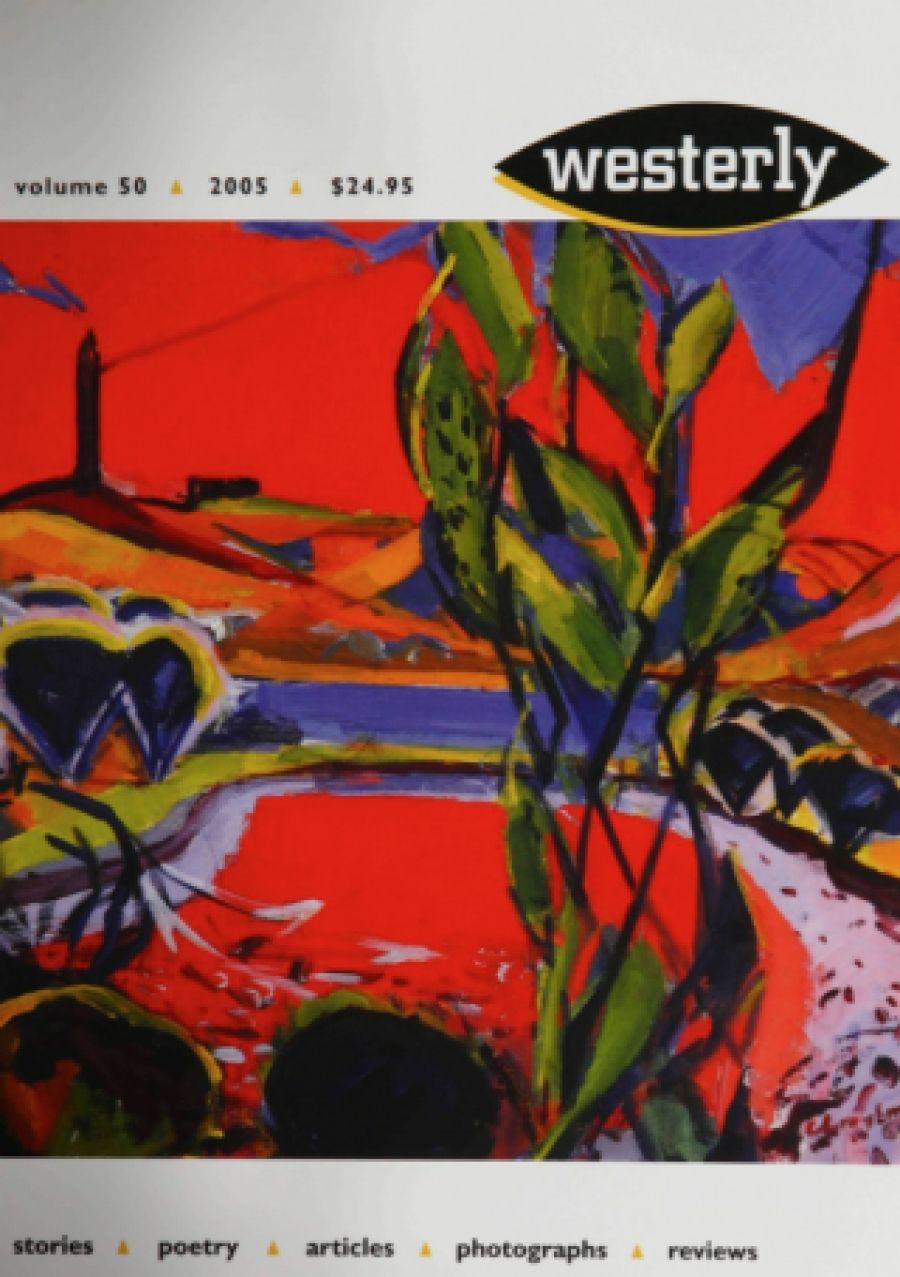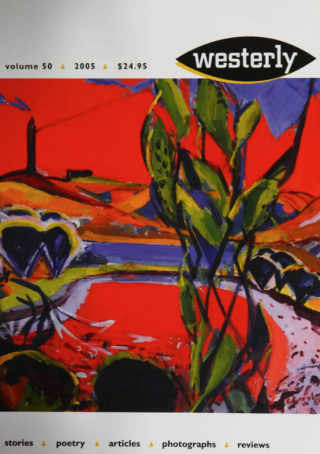
- Free Article: No
- Contents Category: Journals
- Review Article: Yes
- Article Title: God’s gift
- Online Only: No
- Custom Highlight Text:
As an academic teaching in literary studies, I regularly feel compelled to justify my job, particularly in the light of dwindling enrolments. Literary journals and the writers who feature in them, judging by the latest issue of Westerly, also feel pressure to defend their relevance, primarily due to their small audiences. Delys Bird and Dennis Haskell, in an editorial commemorating fifty years of Westerly, pay tribute to the ‘creative and intellectual enthusiasm’ that drives the journal and celebrate its survival in a culture they believe is becoming increasingly visually, rather than verbally, literate. Tracy Ryan, one of the contributors, alludes to a different obstacle: public resentment. Her poem ‘Curriculum Vitae’ summarises public attitudes to writers: ‘Narcissism, egotism, think the world owes you a living, / God’s gift.’ What to do in the face of such indifference and even dislike?
- Book 1 Title: Westerly vol. 50, November 2005
- Book 1 Biblio: $24.95 pb, 296 pp, 0975003631
- Book 1 Cover Small (400 x 600):

- Book 1 Cover (800 x 1200):

- Book 2 Title: Australian Literary Studies vol. 22, no. 2, 2005
- Book 2 Biblio: $45 pb, 136 pp, 0702235601
Robert Drewe offers a possible solution to expanding readerships. ‘Prison Diary’, a highlight, narrates his experiences teaching Creative Writing in an English prison. The piece provides terrific allegorical potential. When the writer enters the prison grounds, an inmate yells obscenities at him. Drewe, as an Australian, has automatic cachet, but the inmates care less about his writing classes than about Neighbours and Home and Away. The prisoners also like to watch violent, misogynistic videos, riot and play drums. The books in the library are untouched. While Drewe sets up a vision of the absurdity of literary practice, he also provides a disturbing image of a world without it: small, insular, primitive, ugly. The philosopher Charles S. Peirce wrote: ‘My language is the sum total of myself.’ The prisoners, with their limited vocabularies and narrow range of narratives, certainly don’t amount to much.
Proving that literature is worthwhile, however, remains a considerable challenge. Bruce Bennett, a former editor of Westerly, argues that: ‘Learning afresh to speak to the Australian public is crucial to literary magazines and to universities.’ Westerly, which is inclusive in terms of culture, gender and genre, is certainly trying to communicate to a wide audience.
In prose, it has almost everything. There is memoir, as practised by Drewe, and the short story. Peter Manning’s ‘Lingua’ provides a fine example with its haunting vision of the world as simulacra disguising a violent underbelly. The confluence of events conveys it all: the narrator’s computer won’t work, a xenophobic carpenter visits, the narrator helps an ex-girlfriend to obtain an abortion, he remembers his father killing a goat, and his uncle, suffering from dementia, whispers: ‘We slit our throats and smile.’ There are a number of excerpts from works in progress that cover a range of genres, including fantasy and science fiction, albeit with a political bent. The extract from Kim Scott’s Naatj, for example, involves the capture of an Aboriginal mythical figure by two white scientists. The excerpt from Terri-ann White’s Arriving follows the realist tradition, but is similarly political. In the excerpt from Sarah Hay’s Texas, the protagonist, a housebound, isolated woman on an outback farm, learns a local history of Aboriginal slavery. There is also parable. Chris McLeod’s ‘Floating Ophelias’, a fairy tale about an artist who is famous for painting suffering women and who kills women who want more, is a disturbing narrative about misogyny and cultural ideas of female masochism.
The poetry is similarly diverse. John Kinsella’s ‘Inheritance: Fetish Sestina’ is outstanding, a narrative poem that moves from anti-pastoral to misogynistic nightmare. When the narrator’s father-in-law dies, he inherits his dark obsessions. The narrator’s reflections upon his wife’s nightie in his tractor (‘much more interesting than oily hessian on the pneumatic seat’) are deeply unsettling. Lucy Dougan’s ‘Young Boy with Daffodils’ and ‘Frangipanis’ are intimate, gothic portraits of, respectively, a mother’s loss of a growing son (‘the darker / green and broken swathe / you have cut away from me’) and an early experience of sex (‘our bodies cried out / for what we had done / and did not understand – / all of it in flowers’). Caroline Caddy’s ‘Diminished Responsibility’ and ‘Firebreak’ are dramatic, the first describing the dynamic between a firelighter and a firefighter: ‘Two years our summers edgy with each other – / roused from dreams of fire / to fire – our bodies out there like spectres we can’t control.’ Barbara Temperton’s ‘The Lighthouse Keeper’s Wife’ provides a claustrophic portrait of domesticity, death and madness: ‘remembering her daughter’s dog barking until its voice was gone, / she wonders how long she could scream / before she would not make another sound.’ Political poetry also features, such as Nigel Gray’s ‘Ali Ismaeel Abbas (Iraq 2003)’, in which the Bush, Blair and Howard triumvirate is memorably described as ‘those three stooges / who murder language / with impunity, / as if words were children’.
Westerly also features literary criticism, the most accessible being the review essays on annual writing in Australian poetry, fiction and non-fiction, although Syd Harrex’s survey of recent Australian poetry is decidedly male-focused. Karen Welberry’s essay on the metaphor of horse-breaking in Australian culture is driven by important concerns, taking up Tim Flannery’s attack on the ‘beautiful lies’ that have led to Australia’s current humanitarian crisis – something much of the poetry and fiction is interested in.
While literary criticism is even less popular than literature, the interrogations of the narratives that make up our lives, practices that underlie current literary and cultural studies, are crucial to the development of a humanitarian society. Literature itself shouldn’t be exempt from questioning, and in Westerly it isn’t. Michael Heald’s poem ‘The Poets’ finishes with ‘no more making the foolish beautiful’, while ‘The Metaphor Spark’ asks if metaphor gives us a glimpse of ‘starvation, not plenitude’. Robert Dixon’s essay on Tim Winton, exploring how marketing and the Zeitgeist have made him successful, similarly questions the authority of literature. Probing the narratives of our lives – even the literary ones – is necessary, although the current trend to deny the power of the aesthetic strikes me as populist, oddly puritanical and ultimately self-defeating.
Australian Literary Studies, being a professional journal, could be less concerned with broad appeal and justifying its existence. However, the latest issue contains much of general interest and importance.
Anne Pender’s essay on the poetry of Anna Wickham reveals an intriguing Australian woman: cosmopolitan, bohemian, feminist, bisexual, wife, mother, poet and actor, who associated with the likes of D.H. Lawrence and Katherine Mansfield. Yvonne Smith’s examination of the drafting process behind David Malouf’s An Imaginary Life is similarly fascinating. Beginning his project, Malouf confesses in a journal entry: ‘I have very little idea where I am going before I start – I am writing from the bottom of my mind somewhere, I don’t quite know what I am drawing on, it isn’t direct experience.’ He goes on, however, to write half of the book in ten days. Natalie Seger’s examination of transcendence in Malouf’s poetry is also appealing and significant, containing ruminations on other great Malouf mysteries. Music, for instance, Malouf reflects, is ‘the language of another order of beings’ and yet our bodies are involved in it. Another quote: ‘we have to discover the sacred in our being human – or we’re lost.’ Seger argues that Malouf’s poetry, in encouraging awareness of the sacred in the profane, or of the ‘other’ in the self, engages in a humanitarian ‘ethics in which the self and the other are variously and inextricably bound’.
Another noteworthy essay is Ruth Blair’s discussion of the poetry of the late Margaret Scott, to whom this issue of Australian Literary Studies is dedicated. Blair beautifully argues that Scott’s poetry reveals a migrant’s sensitivity to the dialogical nature of identity, need for connections, and recognition of both ‘our inevitable situatedness’ and the larger context of world and cosmos.
Lyn McCredden’s essay on the poetry of Pam Brown is also engaging, focusing on what appears to be a common interest, the sacred, figured as imminent in the profane (à la Malouf) and thus both attractive and repulsive. McCredden argues that, while Brown presents herself as a poet of ‘un-transcended / life itself’, Brown’s recurrent theme is not only ‘the impossibility of the sacred’ but also ‘the impossibility of resting with that impossibility’. It’s a nice rejoinder to the puritans and sceptics.


Comments powered by CComment